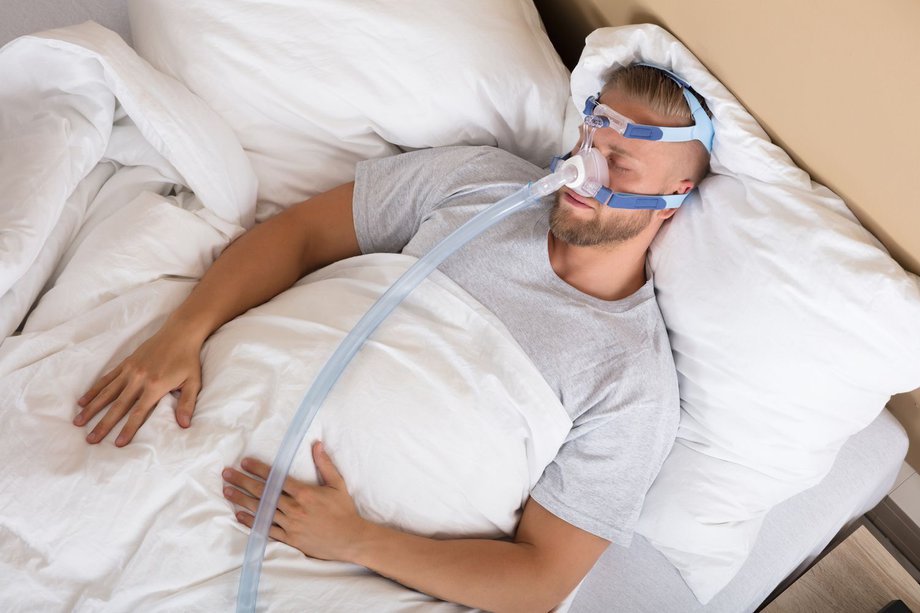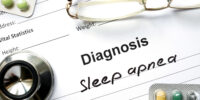Why Should You Educate Yourself And Others About Sleep Apnea?

Sleep apnea is a common sleep disorder that affects millions of people worldwide. Despite its prevalence, many individuals remain unaware of the condition and its potential health risks. Educating oneself and others about sleep apnea is crucial for a variety of reasons.
Firstly, understanding its causes and symptoms allows individuals to recognize and address their own potential sleep apnea issues. Moreover, untreated sleep apnea can lead to serious health complications, such as cardiovascular problems and cognitive impairments. By learning about available treatment options, individuals can improve their sleep quality and overall health.
Additionally, spreading awareness about sleep apnea can help others get diagnosed and receive proper treatment. Supportive resources for sleep apnea patients and their loved ones are also available, offering valuable information and guidance. Advocating for sleep apnea awareness and research funding can further contribute to finding effective treatments.
Ultimately, educating oneself and others about sleep apnea can make a positive impact on both personal lives and the lives of others.
Key Takeaways
- Educating yourself and others about sleep apnea is important because it allows individuals to recognize the causes and symptoms of the disorder, enabling them to address potential issues.
- Untreated sleep apnea can lead to serious health complications, such as cardiovascular problems and cognitive impairments, making it crucial to raise awareness and encourage early detection and intervention.
- Available treatment options, such as CPAP therapy, dental devices, and lifestyle changes, can significantly improve sleep quality and reduce symptoms of sleep apnea, emphasizing the importance of education and understanding these options.
- Joining support groups and online communities can provide emotional support, a sense of community, and access to knowledge and resources for managing sleep apnea, making it beneficial to connect with others who share similar struggles.
Understand the Causes and Symptoms of Sleep Apnea
The causes and symptoms of sleep apnea can be better understood by examining the obstructive nature of the condition, characterized by repetitive episodes of upper airway collapse during sleep, leading to fragmented sleep patterns and subsequent daytime sleepiness.
Obstructive sleep apnea (OSA) is primarily caused by anatomical factors, such as excess weight, narrowed airways, or enlarged tonsils. Other risk factors include age, gender, family history, and certain medical conditions.
OSA is often accompanied by loud snoring, choking or gasping during sleep, morning headaches, and difficulty staying asleep. Additionally, individuals with sleep apnea may experience excessive daytime sleepiness, irritability, poor concentration, and a reduced quality of life.
By understanding the causes and symptoms of sleep apnea, individuals can recognize the condition and seek appropriate diagnosis and treatment, improving their overall health and well-being.
Recognize the Health Risks Associated with Untreated Sleep Apnea
Recognizing the health risks associated with untreated sleep apnea is crucial in order to fully understand the potential dangers and implications of this sleep disorder.
Sleep apnea is a serious condition that can lead to various health complications if left untreated. One of the primary risks is an increased likelihood of developing cardiovascular diseases such as hypertension, stroke, and heart failure. The repeated interruptions in breathing during sleep can cause a strain on the cardiovascular system, leading to high blood pressure and an increased risk of potentially life-threatening events.
Additionally, untreated sleep apnea has been linked to an increased risk of diabetes, obesity, and depression. The chronic sleep deprivation caused by the disorder can also impair cognitive function and increase the risk of accidents and injuries.
Therefore, educating oneself and others about sleep apnea is vital to promote early detection and appropriate treatment, reducing the potential health risks associated with this condition.
Learn about Available Treatment Options
This paragraph introduces a discussion on the available treatment options for sleep apnea.
Continuous Positive Airway Pressure (CPAP) Therapy: This treatment option involves using a machine that delivers a continuous flow of air to keep the airways open during sleep.
Dental Devices and Oral Appliances: These devices and appliances help to reposition the jaw and tongue to improve airflow.
Lifestyle Changes and Weight Management: This treatment option focuses on addressing underlying factors such as obesity and unhealthy habits that contribute to sleep apnea.
These treatment options aim to alleviate the symptoms and health risks associated with sleep apnea.
Continuous Positive Airway Pressure (CPAP) Therapy
Continuous Positive Airway Pressure (CPAP) therapy, a widely used treatment for sleep apnea, helps to maintain an open airway during sleep by delivering a continuous flow of pressurized air through a mask. This therapy has proven to be highly effective in reducing the symptoms of sleep apnea and improving the quality of sleep for individuals affected by this condition.
Here are four key benefits of CPAP therapy:
- Improved breathing: CPAP therapy ensures a constant flow of pressurized air, which helps to keep the airway open and prevents breathing disruptions during sleep.
- Enhanced oxygen levels: By maintaining an open airway, CPAP therapy increases the amount of oxygen that reaches the lungs, improving overall oxygenation of the body.
- Reduced daytime sleepiness: With better quality sleep, individuals undergoing CPAP therapy often experience a reduction in daytime sleepiness, leading to improved alertness and productivity.
- Lower risk of associated health problems: CPAP therapy has been shown to reduce the risk of developing cardiovascular diseases, such as hypertension and stroke, which are commonly associated with untreated sleep apnea.
Overall, CPAP therapy plays a crucial role in effectively managing sleep apnea and improving the overall health and well-being of individuals affected by this condition.
Dental Devices and Oral Appliances
Dental devices and oral appliances are effective treatment options for managing sleep apnea and improving the quality of sleep. These devices are designed to reposition the jaw and tongue, thereby preventing the collapse of the airway during sleep. By keeping the airway open, dental devices and oral appliances help to reduce the frequency and severity of breathing interruptions that characterize sleep apnea.
To provide a visual representation of dental devices and oral appliances, the following table illustrates some commonly used types:
| Type of Device | Description |
|---|---|
| Mandibular Advancement Device (MAD) | This device fits over the upper and lower teeth, holding the lower jaw forward and preventing the tongue from blocking the airway. |
| Tongue Retaining Device (TRD) | This device holds the tongue in a forward position, preventing it from falling back and obstructing the airway. |
| Palatal Expansion Device | This device widens the upper jaw, creating more space for the tongue and reducing airway obstruction. |
| Mandibular Repositioning Appliance (MRA) | Similar to the MAD, this device holds the lower jaw forward to keep the airway open. |
| Combination Therapy | Some devices combine the features of MAD and TRD to provide more comprehensive treatment. |
Dental devices and oral appliances offer an effective and non-invasive treatment option for individuals with sleep apnea. By using these devices, individuals can experience improved sleep quality and reduced symptoms of sleep apnea.
Lifestyle Changes and Weight Management
Lifestyle changes and weight management play an essential role in managing sleep apnea. By making certain modifications to daily habits and adopting a healthier lifestyle, individuals can significantly improve their sleep quality and reduce the severity of their symptoms.
Maintaining a healthy weight is particularly crucial, as excess weight can contribute to the narrowing of the airway and increase the likelihood of experiencing breathing interruptions during sleep.
Additionally, establishing a regular sleep schedule and incorporating regular exercise can help improve overall sleep patterns and reduce the severity of sleep apnea symptoms.
Avoiding alcohol and sedatives, which can relax the throat muscles and worsen sleep apnea, is another important lifestyle change.
Making these adjustments can lead to a more restful sleep and improved overall well-being.
- Engaging in regular physical activity
- Establishing a consistent sleep schedule
- Avoiding alcohol and sedatives.
Improve Your Sleep Quality and Overall Health
Enhancing sleep quality and promoting overall health can be achieved through education and awareness about sleep apnea. Sleep apnea is a common sleep disorder characterized by pauses in breathing during sleep. These pauses can last from a few seconds to minutes and occur multiple times throughout the night. It can lead to daytime sleepiness, fatigue, and an increased risk of developing other health conditions such as high blood pressure, heart disease, and diabetes. By educating oneself and others about sleep apnea, individuals can better understand the importance of seeking treatment and adopting healthy sleep habits. This can include maintaining a consistent sleep schedule, creating a comfortable sleep environment, and avoiding stimulants such as caffeine and nicotine before bedtime. Additionally, adopting lifestyle changes such as regular exercise and weight management can also help improve sleep quality and overall health.
| Benefits of Educating Yourself and Others about Sleep Apnea | |||
|---|---|---|---|
| Increased awareness of sleep apnea and its consequences | Improved adherence to treatment plans | ||
| Prevention of potential health complications | Enhanced sleep quality | ||
| Improved overall health and well-being | Increased productivity and alertness | ||
| Better understanding of healthy sleep habits | Reduction in daytime sleepiness | Enhanced cognitive function and memory retention. |
Spread Awareness to Help Others Get Diagnosed and Treated
Raising awareness about the symptoms and consequences of sleep apnea can play a crucial role in facilitating the diagnosis and treatment of this common sleep disorder. By educating others about sleep apnea, you can help them recognize the signs and seek medical attention. This, in turn, can lead to early diagnosis and appropriate treatment, improving their overall health and quality of life.
To spread awareness effectively, consider the following points:
- Provide information about the common symptoms of sleep apnea, such as loud snoring, excessive daytime sleepiness, and morning headaches.
- Highlight the potential health consequences of untreated sleep apnea, such as high blood pressure, heart disease, and stroke.
- Encourage individuals to consult a healthcare professional if they suspect they may have sleep apnea, emphasizing the importance of proper diagnosis and treatment.
By actively educating yourself and others about sleep apnea, you can contribute to a healthier society by helping individuals receive the necessary care and support for this often overlooked condition.
Supportive Resources for Sleep Apnea Patients and their Loved Ones
This paragraph introduces a discussion on the subtopic of supportive resources for sleep apnea patients and their loved ones. It focuses on two key points: support groups and online communities, as well as educational materials and websites.
Support groups and online communities provide individuals with a platform to connect with others who are going through similar experiences, offering emotional support and a sense of community.
Educational materials and websites offer valuable information about sleep apnea, its treatment options, and self-management strategies, empowering individuals to become more knowledgeable about their condition.
Support Groups and Online Communities
Support groups and online communities provide a valuable platform for individuals to connect with others who are facing similar challenges and seek guidance, information, and emotional support for sleep apnea. These communities offer a safe space where individuals can share their experiences and learn from others who have successfully managed their sleep apnea. By joining a support group or online community, individuals can gain access to a wealth of knowledge and resources that can help them navigate their journey with sleep apnea.
Furthermore, these communities foster a sense of belonging and understanding, reducing feelings of isolation and providing a support network that can offer empathy and encouragement. The emotional benefits of connecting with others who share similar struggles cannot be overstated, as it can provide a sense of validation, empowerment, and hope for individuals living with sleep apnea.
- Individuals can share their personal stories and experiences to inspire and motivate others.
- Participants can offer practical tips and advice for managing sleep apnea symptoms and treatment.
- Members can provide emotional support, empathy, and encouragement to help individuals cope with the challenges of sleep apnea.
Educational Materials and Websites
Educational materials and websites serve as valuable resources for individuals seeking comprehensive and reliable information on sleep apnea. They offer a wealth of knowledge on symptoms, diagnosis, treatment options, and lifestyle modifications.
These resources provide in-depth explanations of the condition, its causes, and potential consequences. This allows individuals to better understand the importance of seeking medical help.
Furthermore, educational materials and websites often contain practical tips and strategies for managing sleep apnea. These include sleep position modifications and the use of continuous positive airway pressure (CPAP) machines.
They also provide access to the latest research findings, enabling individuals to stay informed about advancements in treatment and potential new therapies.
By educating oneself and others about sleep apnea through these resources, individuals can empower themselves to make informed decisions about their health and seek appropriate medical interventions.
Advocate for Sleep Apnea Awareness and Research Funding
Advocating for increased sleep apnea awareness and research funding is crucial in order to improve diagnosis and treatment options for individuals suffering from this potentially life-threatening condition.
Sleep apnea affects a significant portion of the population, yet it often goes undiagnosed and untreated. By advocating for increased awareness, individuals can gain a better understanding of the symptoms and risks associated with sleep apnea, leading to earlier detection and intervention.
Additionally, advocating for research funding is essential to develop innovative treatments and interventions. Research can help uncover the underlying mechanisms of sleep apnea, leading to more effective treatments and potentially even a cure.
Moreover, increased funding can support the development of educational campaigns to raise awareness among healthcare professionals and the general public, ensuring that individuals with sleep apnea receive the necessary attention and support they require.
Make a Positive Impact on Your Own Life and the Lives of Others
To effect positive change in both personal and collective spheres, individuals can engage in activities that foster personal growth and contribute to the betterment of society. Educating oneself and others about sleep apnea is one such activity that can have a significant impact. By understanding the symptoms, causes, and treatment options of sleep apnea, individuals can make informed decisions about their own health and seek appropriate medical help if needed. Moreover, spreading awareness about sleep apnea can help others recognize the signs and seek timely treatment, potentially improving their quality of life. Additionally, educating others about sleep apnea can contribute to the overall public knowledge about the condition, leading to increased research funding, improved treatments, and better support systems for those affected. By taking the initiative to educate oneself and advocate for sleep apnea awareness, individuals can make a positive impact on their own lives and the lives of others.
| Benefits of Educating Yourself and Others about Sleep Apnea | ||
|---|---|---|
| Personal empowerment through knowledge | Improved quality of life | Enhanced decision-making ability |
| Increased awareness in the community | Timely recognition and treatment | Support for affected individuals |
| Contribution to research funding | Improved treatment options | Better support systems |
| Overall improvement in public health | Reduced health risks | Enhanced well-being |
Frequently Asked Questions
How common is sleep apnea and who is most at risk?
Sleep apnea is a common sleep disorder characterized by pauses in breathing during sleep. It affects approximately 9% of adults and is more prevalent in males, older individuals, those who are overweight, and those with a family history of the condition.
Can sleep apnea be cured or only treated?
Sleep apnea can be managed and alleviated, but not completely cured. Treatment options include lifestyle changes, such as weight loss and avoiding alcohol and sedatives, as well as the use of continuous positive airway pressure (CPAP) machines or oral appliances to maintain airway patency during sleep.
Are there any natural remedies or lifestyle changes that can help alleviate sleep apnea symptoms?
Some natural remedies and lifestyle changes, such as maintaining a healthy weight, avoiding alcohol and sedatives, positional therapy, and practicing good sleep hygiene, may help alleviate sleep apnea symptoms.
How does sleep apnea affect mental health and cognitive function?
Sleep apnea has been found to have a significant impact on mental health and cognitive function. It is associated with an increased risk of depression, anxiety, and impaired cognitive abilities, such as memory and attention. Understanding these effects is crucial in managing sleep apnea and its related consequences.
Are there any long-term complications or health risks associated with sleep apnea treatment?
Long-term complications of sleep apnea treatment may include dry mouth, nasal congestion, skin irritation, and discomfort from wearing a mask. However, the benefits of treatment generally outweigh these risks, improving overall health and well-being.











